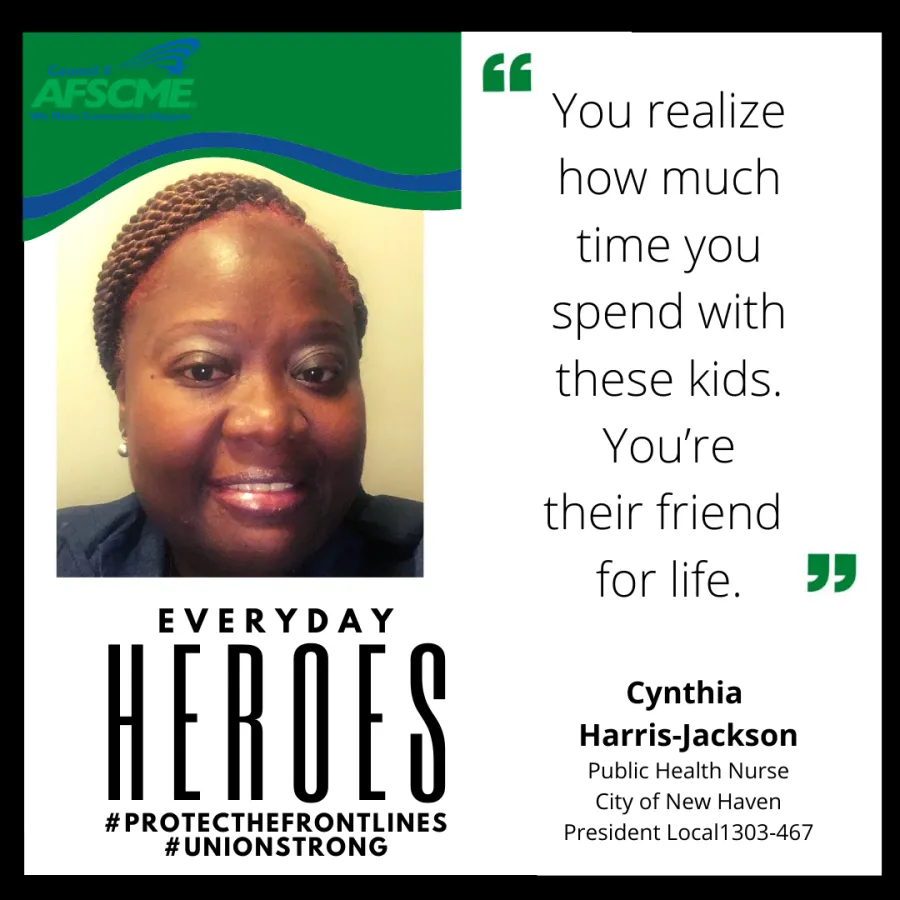A Nurse’s Mission To Care For Her Community

Cynthia Harris-Jackson, President of AFSCME Local 1303-467, knows what it means to transition, especially in terms of career and job scope.
This past decade, she went from working as a corrections officer at Cheshire Correctional Institute to a school nurse. As the COVID-19 pandemic hit, these last few months she shifted from a nurse for her school, Conte West Hills Magnet, to a nurse for the entire city of New Haven. Regardless of the career shifts, she has been an AFSCME Council 4 member throughout.
“It’s like having an extra person there who has your back,” she said.
At Conte West Hills, Harris-Jackson advocates for students and supports the entire school community, including teachers, principals, and parents. When the principal asked if she could discuss the importance of hygiene with the female upper grade level students, she stepped up and obliged.
“You’re the social worker; you’re the counselor,” she said. “You’re a resource for the teachers and the principal. I’ve also developed good rapport with the parents. I’m a part of the school family.”
Besides fulfilling the typical school nurse functions such as providing medications, monitoring diabetes, and ensuring immunizations are up-to-date, she is at times the sole health and medical touchpoint for students.
“There are a lot of gaps,” she said. “We are the only medical people that these children may see. The whole population has become more of an acute care setting for students. We offer flu clinics for the children and even sometimes for the parents. We go out to the communities too.”
More recently, Harris-Jackson’s time is spent fielding calls for the city’s COVID-19 hotline. She educates residents and first responders about COVID-19 symptoms, proper handwashing, self-isolation, and directs them to testing sites.
“In the beginning there were a lot of calls because people just didn’t know [their symptoms] were unrelated to COVID-19,” she said. “Everyone’s anxiety was high. And the symptoms of COVID-19 are forever evolving. As they become aware of it, we have to become aware of it.”
A cornerstone of her work to slow the transmission of COVID-19 is through contact tracing, which is a disease control strategy that involves investigating cases and their contacts. Thus far, 170 volunteers from the Yale Medical School have joined these efforts in New Haven.
“For every person that is positive, you potentially affect 2-3 people - that’s the domino effect,“ Harris-Jackson explained. “So, the quicker we get involved and do the contract tracing and recommend self-isolation, the better chance it will prevent spreading to someone else.”
Harris-Jackson has also witnessed health disparities and barriers to healthcare outside the school walls - a difficult reality which makes her role even more important. Her colleagues advocated for better translation assistance to service calls from non-English speakers. A lack of transportation to testing sites, including a fear of COVID-19 exposure while using public transportation, are prevalent. Another significant issue is that testing was contingent upon approval from a primary care doctor.
“Especially in underprivileged areas with higher incidence of COVID-19,” she explains, “there are people walking around potentially positive and don’t know it because they don’t have access to care. A lot of people don’t have a regular primary care provider. To tell someone who doesn’t have one that it’s required – that was tough because they wanted to know [if they were positive].”
When Harris-Jackson returns as a school nurse at the end of the summer, she is uncertain what her job will look like. Some of the questions she asks herself are: How do you take every student’s temperature in a 7-hour school day? How do you socially distance students? Will I have PPE to wear? Will teachers send students to me for every cough they hear?
Despite all the unknowns, she is grateful for her second career since the challenges bring opportunities to learn and provides strong meaning to her life.
“It’s rewarding, especially since you see them come in at Kindergarten,” she said. “Then they’re at 8th grade and about to leave. It’s like, ‘Wow.’ You realize how much time you spend with these kids. You’re their friend for life.”
“My job is a school nurse,” she adds, “and I love it.”
